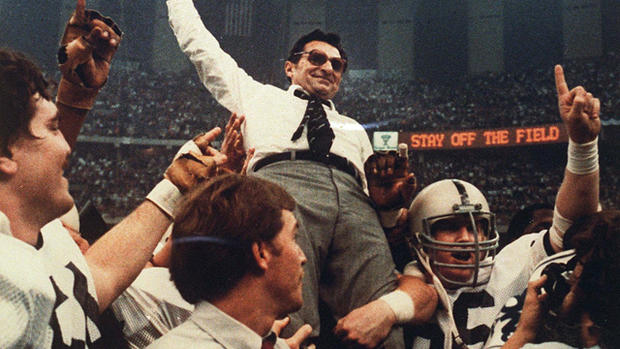Paterno, Penn State helped unify Pennsylvania
PITTSBURGH - For years, Penn State University game days meant long lines of cars and RVs bearing fans making pilgrimages from all corners of Pennsylvania to a school right in the middle of the state, and by extension, to coach Joe Paterno, the man long regarded as its center.
The school's flagship campus, established in 1855 in the small town of State College and conceived as a place for farmers to receive a scientific education, sits in the state's geographic center. But its physical presence is also woven throughout Pennsylvania, with two dozen campuses scattered across the state.
So Paterno's death from cancer on Sunday has created emotional ripples that have spread throughout the university's broad network of alumni, both within the state and far beyond.
Penn State's delicate dance remembering Paterno
Joe Paterno's death met with grief in State College
Ex-Penn State coach Joe Paterno dead at 85
In a state where professional sports loyalties are usually divided between Philadelphia and Pittsburgh, the Penn State Nittany Lions are a team embraced by all Pennsylvanians.
Many alumni credit Paterno not just with winning national college football titles, but for helping to transform a rural agricultural college into a 21st century scientific and engineering powerhouse.
"He, along with his wife Sue, helped transform a sleepy land grant institution in the center of a blue collar state into an academic giant. Penn State became an elite institution without becoming elitist in large part due to the leadership of this Ivy League-educated man from Brooklyn," said Anthony Lubrano of Glenmoore, Pa., who graduated in 1982 and is seeking a seat on the school's Board of Trustees. "His contributions to humanity far outweigh his notoriety on the gridiron."
Former Penn State receiver Kenny Jackson, who played on the 1982 national title team, recalled a coach who demanded at least as much from his players in the classroom as he did on the field.
"I just remember how important it was that we got educated. I know it sounds clichDed, but I saw the man do it every day. That man made sure I got an education," Jackson said.
In a larger sense, Paterno continued a tradition that began when the school's founders challenged the assumptions of the mid-19th century.
"The goal was to apply scientific principles to farming, a radical departure from the traditional curriculum grounded in mathematics, rhetoric, and classical languages," Penn State's official history notes.
And though the last few months of Paterno's life were tarnished by the child sex abuse scandal involving former assistant coach Jerry Sandusky, some said that the time has come to judge him on the full circle of his career. Sandusky is accused of molesting 10 boys over a 15-year span, sometimes in the football building.
Complete coverage: The Penn State Scandal
Thousands of people paid tribute to Paterno during a candlelight vigil outside Penn State's administration building Sunday night. Former players were among those who spoke, including Oakland Raiders offensive lineman Stefen Wisniewski.
"When I think back on Joe Paterno's legacy, the events of the last two months won't even cross my mind," Wisniewski said.
Today Penn State has more than 557,000 living alumni and it's become one of the largest employers in the state. But Paterno and the school managed to hold on to some admirable small town qualities.
"At the end of the day he was just another dad, too," said Bob Branstetter, who grew up in State College and was on the high school hockey team with Paterno's son, Scott. "There was never an air around Joe Paterno. He was iconic, but he was just a normal guy."
Chris Wesling, 22, a college senior from Pittsburgh studying psychology, said the school has a strong sense of togetherness, despite its far flung physical nature.
"The branch campuses help," Wesling said, "and sports is a universal language."
Former Pennsylvania Gov. Ed Rendell said it's true that Penn State alumni and fans are "everywhere" in the state, and that Paterno ran what became known as Pennsylvania's football team.
Paterno balanced football with academia "as well as anybody," Rendell said, but added that "he made a mistake" in the case of Sandusky, who has maintained his innocence.
"He should have inquired about why nothing was done" to Sandusky after the first reports of abuse, Rendell said, while adding that doesn't negate Paterno's good deeds, such as giving millions back to the school.
"He made a mistake, but I think Joe Paterno still lived an incredibly positive life. He goes down in my book as an incredible human being," Rendell said.

